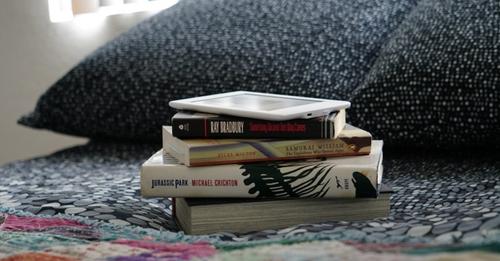I love books. I can’t leave a bookstore without at least one. But I also have a tendency to buy books and not read them. Somewhere along the way, reading fell by the wayside in favor of other forms of entertainment. To get back on track, I made some simple changes that have helped me with my reading habits so far, without speed reading.
I made my environment easier to read
My first priority was to make it easier to read in general. I’m like electricity: I want to take the path of least resistance. If there’s an obstacle in my way, I give up and do whatever is easiest to access and equally satisfying in the moment. In my case, that usually means turning on the TV, fiddling with my phone, playing a video game, or eating until I fall asleep.
To solve this, I relied on a quote I once heard about software piracy. It goes something like “To fight piracy, you have to make your content easier to buy than downloading it illegally.” Basically, I realized that I wasn’t buying reading because I had made it difficult to access it. My reading light was in a bad position where I couldn’t comfortably reach the switch from my bed. I had to get out of bed to turn it on or off. Also, my bed was too high and was attached to the window sill, so I couldn’t lean against it when I didn’t feel like holding a book over my head. Worst of all, I had a giant TV in my room – why read when I could fall asleep to Bob’s Burgers every night?
So I moved my reading light to a better place and got a Kindle Paperwhite with a decent backlight. I fixed up my bed so it would be more comfortable to lie on and hold a book without worrying about dropping it on my face. And I took the TV out of my room. Just removing the TV made a big change for me. I also moved my handheld gaming systems and stopped keeping my phone near my bed so there would be no other temptations when it was time to read. Now there are only a few things I can do in my room: I can read, listen to music or sleep; that’s it. The perfect reading environment makes picking up a book the easiest option.
I carry my books everywhere
I’ve talked before about carrying my books everywhere, for example, when you have a reading deadline, but I hadn’t gotten into the habit of doing it until I read a story Neil Pasricha shared in Harvard Business Review about the writer Stephen King:
…Stephen King had advised people to read something like five hours a day. My friend said, “You know, that’s silly. Who can do that?” But then, years later, he found himself in Maine on vacation. He was waiting in line outside a movie theater with his girlfriend, and who was waiting in front of him? Stephen King. His nose was stuck in a book the whole time in line. When they entered the movie theater, Stephen King was still reading as the lights dimmed. When the lights came on, he opened his book right away. He even read as he walked out.
That reminded me that there are useful minutes tucked away in every corner of the day. So I started taking the Kindle with me almost everywhere. Instead of pulling out my phone and scrolling through my Twitter feed, or reading a bunch of depressing news articles, I pull out my Kindle instead. And yes, you can read e-books on your smartphone, but I think it’s too easy to get distracted by other apps and notifications. Carrying a Kindle isn’t ideal-it barely fits in my back pocket and sometimes I forget it in the car-but it’s almost always nearby and ready to go.
I know audiobooks can also be useful for people, especially when you want to make the most of all those hours commuting to work, but I personally don’t like them. The voice of the reader always marks my experience and, as a writer, I like to see the grammatical construction of the story. It’s hard to learn from other writers if you just listen to them. But that may not be a problem for you, so by all means turn to audiobooks if they help.
I give up books I don’t enjoy.
There is a certain amount of ego that is attached to reading books for me. I know I felt like I had to finish reading the books I started or I was “a quitter,” or “not smart enough,” or “missing out on something culturally significant.” But all of that is a lie. Enjoying books is no different than enjoying a TV show or a movie. If you don’t like a show, you stop watching it and watch something else. If you don’t like a book, you stop reading it and read something else.
Reading a book should be an experience that brings you joy and value, not something that makes you work. When reading stops feeling like work, it feels more like fun. And if it feels more fun, you’ll do it more. It’s okay to give up Infinite Jest. You just have to quit. No one is going to judge you. There you have it. Now get the book you want to read and go to town.
I started reading three and only three books at a time.
Some people can read a single book in a day or two. I can’t. I get bored and want to change the channel because I’m a Nickelodeon brainwashed millennial. I read several books at a time so I can alternate between them and everything always feels fresh.
That said, I was doing it with too many books at once. I had so many books on my plate that, again, reading was starting to feel like a chore because I couldn’t keep up with all the facts and plot lines. I now have a cap of three books at a time: one fiction, one nonfiction, and one graphic novel or similar. I either have to finish a book to keep going, or I abandon it.
I talk more about books with others
The more I talk about something, the more excited I get about it. So I’ve made books a priority topic of conversation, rather than movies, TV shows or games. When I chat with friends, whatever I’m reading comes first. That makes me more excited about the activity in general, and often gets me good reading recommendations from others. And that, in turn, feeds the “read the book, talk about the book, get excited about the book, read more of the book, yay the book” cycle.
Talking about what I’m reading also adds a certain layer of public accountability and I start to set certain expectations in my mind. I think things like “if I don’t finish it, they’ll think I’m a quitter” or “I have to finish it now in case they ask me how I did.” This is doubly true for books that are recommended to me or books that I’m reading at the same time as a friend. If I don’t read it, I can’t enjoy conversations about it, which is my favorite part.
I “complete the cycle” when I read
At home, I have a rule of thumb called “complete the cycle.” Simply put, it means finishing what you start, leaving things as you found them, and not procrastinating on things that can be done now. I have applied the same concept to my reading habits and it has worked wonders.
When I sit down to read, I always aim to complete the cycle. And “the cycle” can be anything I determine before my reading session. It can be setting a timer for 20 minutes and doing a sprint of reading with no distractions the entire time. It can be finishing a chapter I just started. It may be reading a set number of pages. Whatever it is, I commit to it and stick to it. Most of the time, I get sucked into the book and read even more than I intended to.
I am not a fast reader. In fact, I often reread passages several times to make sure I grasp the story. But these tweaks have helped me make a decent dent in my backlog with minimal effort. I hope these tips can help you too. Now, if you’ll excuse me, I have some reading to do.










